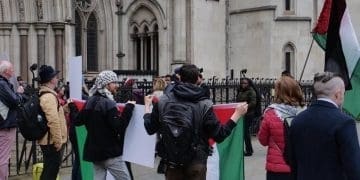16 August 2019 marks the 200th anniversary of the Peterloo Massacre in Manchester, when UK authorities murdered civilians campaigning for democracy. And campaign groups today are marking their deaths with a continued push for “real reform”.
Continuing the battle of Peterloo
Mike Leigh, director of the film Peterloo, previously called the 1819 massacre “a defining moment in our political history” and “one of the most shameful displays of state violence against the people”. Historians, meanwhile, say the event strongly influenced the growing fight for political reforms while boosting the development of the trade-union movement.
To mark the anniversary, members of the modern labour movement paid tribute to those who died two hundred years ago:
200 years ago today 18 people were killed and hundreds injured as they protested for the representation of working people.
The Massacre at Peterloo sowed the seeds for universal suffrage and the trade union movement.
Today we remember those brave protesters.#Peterloo2019 pic.twitter.com/KPMFwRy1os
— GMB UNION (@GMB_union) August 16, 2019
Two hundred years ago today, on St Peter’s Field in Manchester, armed cavalry charged into a crowd of peaceful…
Posted by Jeremy Corbyn on Friday, 16 August 2019
But a new report from Make Votes Matter and the Labour Campaign for Electoral Reform insists that there’s still a long way to go in the fight for justice and equality. As the report’s author Owen Winter stressed in a press release, the UK’s first-past-the-post (FPTP) electoral system:
consistently skews politics to the right and drives up economic and social inequality.
In the report’s introduction, meanwhile, prominent academics asserted that:
it is widely accepted by experts that FPTP has a pronounced conservative bias
And that:
countries with more proportional systems have been more successful in delivering the kind of outcomes associated with egalitarian, compassionate societies.
As Labour MPs Jonathan Reynolds and Rupa Huq also emphasised in the report’s foreword:
It is time for us to learn from our sister parties and embrace Proportional Representation.
Labour must push for “real reform”
On 31 August, hundreds of people will gather at a ‘Politics For The Many’ conference in Manchester. They will push Jeremy Corbyn’s Labour Party to back a bold project of constitutional reform.
As Politics For the Many spokesperson Lynn Henderson said in a press release:
Two centuries today… since the Peterloo Massacre – where 18 people were killed and hundreds injured demanding political reform – the need to overhaul Westminster remains urgent…
the House of Lords remains totally unelected, and our electoral system leaves people feeling voiceless. Our institutions are in dire need of change.
The plans being mooted in No 10 for Boris Johnson to ignore a vote of no confidence or even to shut down Parliament altogether – highlight that our uncodified constitution cannot be relied on. Britain’s centralised political system places too much power in the hands of the executive, and far too little in the hands of citizens and elected representatives.
The Labour movement must now put forward plans for real reform of the Westminster system.
The biggest tribute to those who died at Peterloo? Keep fighting!
Electoral Reform Society senior director Willie Sullivan, meanwhile, insisted in a press release that:
200 years from the first movements for the vote, the majority of Parliamentarians remain unelected, with a House of Lords that too often looks like a private members’ club. Trust in politics is at rock bottom, and millions are excluded and alienated by a Westminster that is distant and out-of-touch.
It is up to politicians to do something about this – to try and restore some trust by giving power back to the public. This has to involve listening to the majority of voters across all sides who want a fairly-elected second chamber and for seats in Parliament to match how we vote…
By far the biggest tribute to the struggles of those at Peterloo would be to kick-start a conversation about political reform today – and what must be done to revitalise the crumbling Westminster set-up.
Two centuries ago, tens of thousands of people rallied in Manchester to demand democracy. But authorities met them with violent repression. The rich and powerful were never going to end their stranglehold on society without a fight. And the same is true today. So if we want a fair, compassionate democracy in the UK, we need to stand up and be counted. Because only together can we truly bring about meaningful change.
Featured image via YouTube













